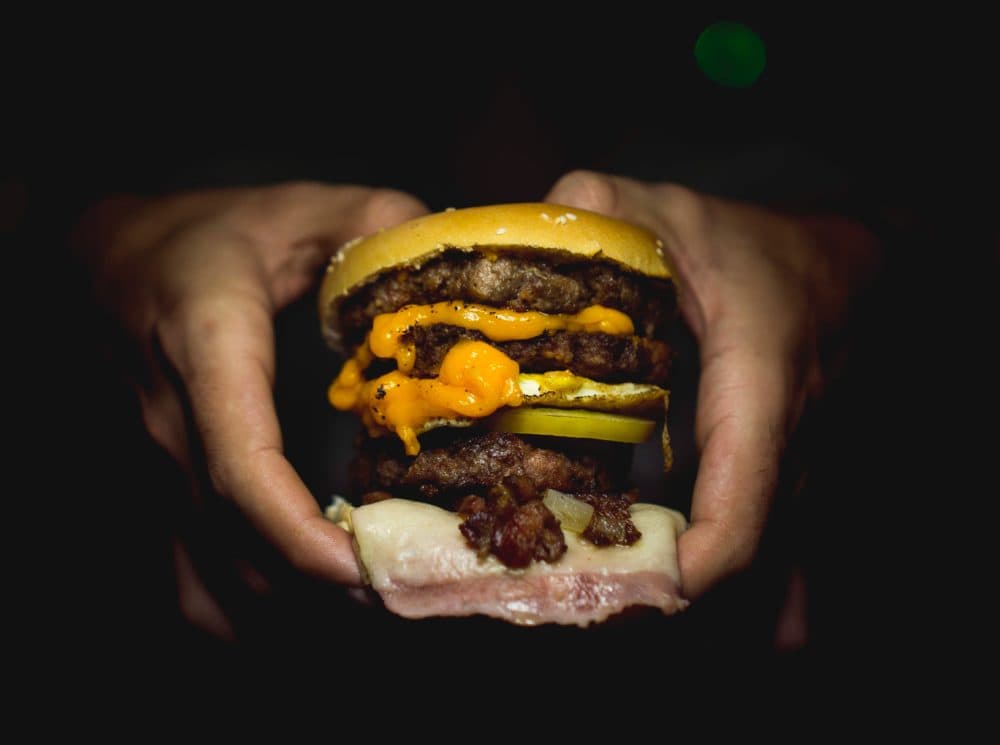Advertisement
Commentary
If You Care About Climate Change, You Should Stop Eating Meat

Tell people I’m a Republican and some brows furrow like a freshly plowed cornfield. I get their reaction, of course; when a party bear-hugs science deniers, wealth worshipers and racists, it has only itself to blame when people compare it to George Wallace’s know-nothings of the segregated 1960s.
That’s why I’ll vote for Democrats in next month’s congressional midterms, party be damned. But my putatively progressive friends often remind me why I’m not one of them either. Among other shortcomings, their actions don’t always match their convictions.
Otherwise, they’d all be vegetarians.
The right has plenty of folks who believe in constitutionally protected carnivorism, of course. But factor in leftists and we veggies still are rarer than a Trump Steak. Only 5 and 3 percent of Americans describe themselves as vegetarian and vegan, respectively. Neither right nor left flanks of our politics will give up their flank steak to save the planet.
You read that right: If you worry about climate change, eating a plant-based diet is one of the most important things we could do about it, immediately, without waiting for Washington’s wafflers. (It would also curb factory farming’s animal cruelty, but that’s another column.)
Clearing dead animals from the freezer couldn’t be more urgent, after the U.N.'s recent warning that deflecting climate change will require altering the global economy in a way with “no documented historic precedent.” Failing to do so could, by 2040, expose 50 million people to coastal flooding, force evacuation of tropical areas, and touch off food shortages and wildfires.
Neither right nor left flanks of our politics will give up their flank steak to save the planet.
A key sector in that must-change economy is agriculture, which contributes 15 percent of the world’s greenhouse gas emissions, with meat and dairy production responsible for 60 percent of that output: methane from animal flatulence, nitrous oxide from manure, and carbon dioxide from working the land used to raise livestock. The largest-ever study of farming’s costs, published in the journal Science months before the U.N. report, found that the most sustainable beef production still spews six times more greenhouse gases than growing peas, and a similar factor more than tofu, nuts and beans.
Lead researcher Joseph Poore told The Guardian that “a vegan diet is probably the single biggest way to reduce your impact on planet Earth, not just greenhouse gases, but global acidification, eutrophication, land use and water use. It is far bigger than cutting down on your flights or buying an electric car.”
But even universal vegetarianism, short of veganism, would slash emissions, and like veganism could yield other environmental benefits. (Eating mussels and oysters — so-called ostraveganism -- generally avoids despoiling our waters.)
Poore is hardly alone in advocating plant-eating. Environmental entrepreneur Paul Hawken surveyed researchers to make a list of the 100 most important things we can do to fight climate change. Eating plants clocked in at No. 4.
Still, utopianism, like diet, is another area in which I part ways with some progressive. I no more expect my former, liberal landlord to give up his taste for foie gras than I expect Trump to give up Twitter. But it shouldn’t be too much to ask carnivores who claim concern for the Earth to at least limit their meat-eating, as thoughtful ones have.
Even if we don’t abolish beef and dairy production completely, Poore said that replacing just the most environmentally damaging production with plant-based food would convey two-thirds of the environmental benefits of outright abolition.
More people eating less meat might goose our politics into changing as well. Increased demand for produce might encourage the zeroing out of federal farm subsidies — corporate welfare that goes to a few favored commodity crops — and diverting some of the savings to fruit and vegetable farms, which now get few subsidies. That would make the planet, and our bodies, healthier.
I’m all for other collective efforts, from taxing carbon (which progressives support) to improving and keeping online existing nuclear plants (which many myopically oppose). Other worthy steps include amending government diet guidelines and applauding efforts by food service companies and others to cut back on meat.
Republican climate change deniers, in headlong flight from reality and responsibility, are bad enough. Given the undeniable benefits of curbing meat consumption, progressives should remember that any excuse for ignoring our warming planet, be it outright denial or “pass the lamb chops,” should be unacceptable.
